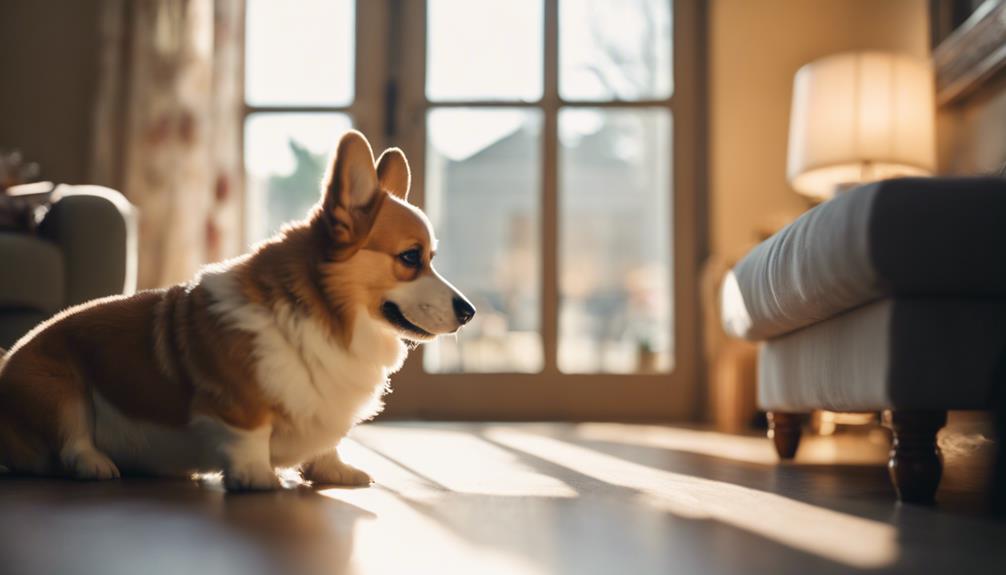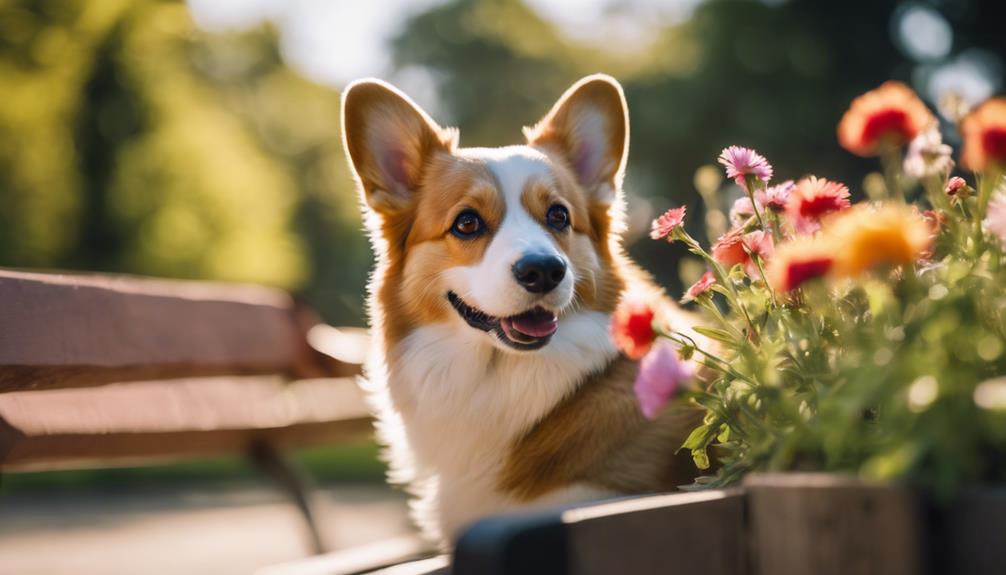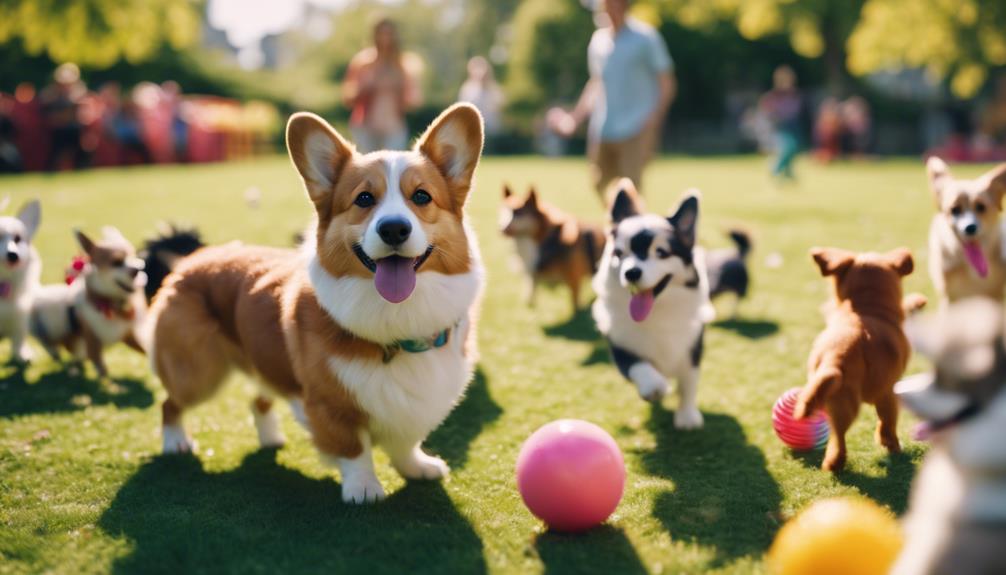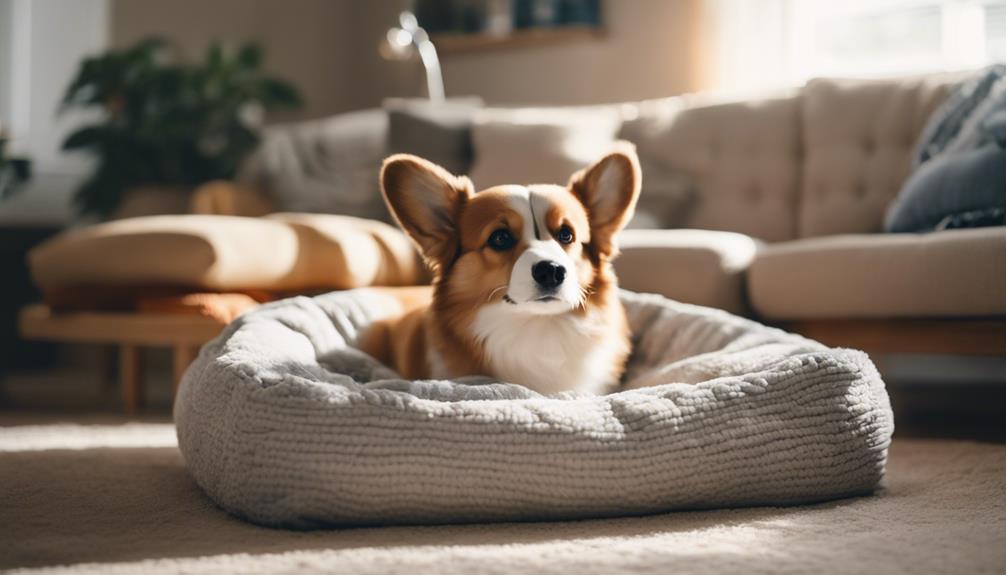Shy Corgis often face unique challenges in social settings, which can hinder their integration into both family life and broader social circles. Understanding their behavior and providing appropriate support is essential for fostering confidence and comfort. This discussion will explore seven effective strategies to help your timid companion thrive in various environments. By employing these techniques, you can significantly enhance your Corgi's social skills and overall well-being. However, the journey to helping your pet fit in requires careful consideration of several factors that may surprise you.
Understand Your Corgi's Behavior

Understanding your Corgi's behavior is essential for fostering a supportive environment that can help them navigate social situations with confidence. Observing corgi body language can provide valuable insights into their feelings. For instance, a tucked tail may indicate fear, while a wagging tail often signals excitement.
Identifying behavior triggers is crucial as well. Common triggers include unfamiliar noises, new people, or changes in routine. By recognizing these signs, you can better anticipate your Corgi's reactions and respond accordingly.
Key behaviors to watch for include:
- Ears pinned back: fear or submission
- Barking: alertness or anxiety
Gradual Exposure to New Environments
To help your shy Corgi adjust to new environments, it is important to start with small outings that are less overwhelming.
Gradually introducing your dog to various sounds and friendly faces can build their confidence and comfort.
Start Small Outings
Initiating small outings can significantly ease your shy corgi into new environments, fostering their confidence and social skills.
Begin with short walks in quiet parks, where distractions are minimal. This allows your corgi to gradually adjust to new sights and smells without feeling overwhelmed. Choose times when the park is less crowded to ensure a calm experience.
During these outings, observe your corgi's behavior and give them time to explore at their own pace. If they seem anxious, consider shortening the outing or taking breaks.
Gradually extend the duration and distance of these outings as your corgi becomes more comfortable. This gentle approach will help them build confidence and enjoy future adventures with you.
Familiarize With Sounds
Gradual exposure to various sounds is essential for helping your shy corgi acclimate to new environments and reducing their anxiety in unfamiliar situations.
Begin with sound desensitization exercises, which involve slowly introducing your corgi to different noises, such as doorbells, traffic, or household appliances. Start at a low volume and gradually increase it, allowing your dog to adjust without becoming overwhelmed.
Incorporating calming soundtracks can also aid in this process. Play soothing music during these sessions to create a reassuring atmosphere.
Consistent exposure to varied sounds in a controlled manner will help your corgi build confidence. Over time, these strategies can significantly enhance their comfort level, making outings and new experiences more enjoyable for both you and your furry friend.
Introduce Friendly Faces
Introducing friendly faces to your shy corgi is a crucial step in easing their anxiety and fostering a sense of security in new environments. Start by inviting calm, dog-friendly friends to your home, allowing your corgi to interact in a safe space.
Gradually expose them to dog-friendly events, such as local meet-ups or training classes, where they can encounter new people and pets at their own pace.
Here are some socialization tips to consider:
- Choose familiar locations for initial introductions.
- Keep interactions short to avoid overwhelming your corgi.
Socialization With Other Dogs

Socialization with other dogs is a crucial step in helping your shy corgi become more confident.
Utilizing gradual exposure techniques allows your pet to meet other dogs in a controlled manner, reducing anxiety and fostering comfort.
Additionally, incorporating positive reinforcement strategies, such as treats and praise, can encourage friendly interactions and create a more enjoyable experience for your corgi.
Gradual Exposure Techniques
Utilizing gradual exposure techniques can significantly enhance your shy Corgi's comfort level when interacting with other dogs. Start by introducing your Corgi to other dogs in controlled environments, such as quiet parks or backyards. This allows for a safe and manageable setting.
Begin with desensitization exercises, where your Corgi observes other dogs from a distance before gradually decreasing that space.
- Step 1: Observe dogs from afar.
- Step 2: Move closer as your Corgi becomes more relaxed.
These techniques not only help build confidence but also promote positive associations with other dogs, making future encounters less stressful for your shy Corgi.
Positive Reinforcement Strategies
Implementing positive reinforcement strategies can significantly encourage your shy Corgi to engage more comfortably with other dogs during socialization efforts. Utilizing techniques such as treat motivation and clicker training can help create a positive connection between your Corgi and other dogs.
Here are some effective strategies:
- Reward Calm Behavior: Use treats to reward your Corgi for calm interactions with other dogs, reinforcing good behavior.
- Clicker Training: Employ a clicker to mark desired behaviors, making the training process clear and rewarding for your Corgi.
These methods can help reduce anxiety and promote a more confident demeanor in social situations.
Positive Reinforcement Techniques
Positive reinforcement techniques are essential for encouraging desirable behaviors in shy Corgis, fostering their confidence and helping them adapt to new environments.
One effective method is clicker training, which uses a sound to mark good behavior, followed immediately by a treat reward. This creates a positive association in your Corgi's mind, reinforcing the desired action.
For example, when your Corgi approaches a new person or environment, clicking and providing a treat helps them understand that this behavior is acceptable and rewarding. Additionally, consistency is key; rewarding your Corgi every time they exhibit bravery will strengthen their confidence over time.
Organize Playdates With Friendly Pets

How can organizing playdates with friendly pets enhance your shy Corgi's socialization skills and boost their confidence?
Setting up safe, positive interactions with compatible pets is essential for your Corgi's development. Choosing the right playdate locations can make a significant difference, as environments that are familiar or less crowded can reduce anxiety.
Here are some tips for successful playdates:
- Choose compatible pets: Look for dogs with friendly and calm temperaments to ease your Corgi's nervousness.
- Select safe environments: Opt for quiet parks or backyards where distractions are minimal.
These steps can help your Corgi build confidence while enjoying social interactions.
Enroll in Training Classes
Enrolling your shy Corgi in training classes can significantly enhance their social skills and overall confidence while providing valuable structure and guidance.
These classes often focus on obedience training, which helps your Corgi learn essential commands such as sit, stay, and come. This training not only promotes good behavior but also encourages confidence building through positive reinforcement.
Additionally, group classes expose your Corgi to other dogs and people, creating opportunities for socialization.
Here are some key benefits of training classes:
- Improved obedience skills
- Increased confidence in various environments
- Enhanced bond between you and your Corgi
Create a Safe Space at Home

Establishing a safe space at home is vital for helping your shy Corgi feel secure and comfortable, especially after the social experiences gained in training classes.
Creating a designated area with familiar elements can significantly reduce anxiety. Here are some key features to include:
- Comfortable bedding: Provide a soft bed or blanket where your Corgi can rest peacefully.
- Quiet corners: Choose a low-traffic area in your home, away from loud noises, where your dog can retreat when feeling overwhelmed.

